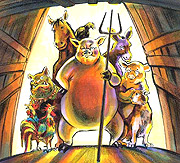But some animals really are more equal than others International justice causes embarrassment and suspicion. The embarrassment is brought about by questions on its legitimacy in the absence of a unified world state. The suspicion arises from worry that irresponsible empire-thirsty nations might use it to entrench their domination of others. It sounds nice to say proudly that sub-Saharan African countries won their independence from their colonisers.


But some animals really are more equal than others
International justice causes embarrassment and suspicion. The embarrassment is brought about by questions on its legitimacy in the absence of a unified world state.
The suspicion arises from worry that irresponsible empire-thirsty nations might use it to entrench their domination of others. It sounds nice to say proudly that sub-Saharan African countries won their independence from their colonisers.
However, it would take a genius to explain to us clearly how and to what extent the countries are really independent. In everything ranging from mere survival to first steps in development, there is need for tutelage from the so-called developed countries.
Whether it is in the production of the goods or the invention of ideas, colonised Africa is not yet weaned from the West. Not only are African countries still dependent on their former colonisers, but also most of its nationals seem to get undisguised pleasure in the dependence.
Admittedly, the current situation is due mainly to leaders who use their people instead of serving them, and for whom the people’s needs are less important than their own. However, that does not reduce in any way the West’s responsibility for colonisation.
In the novel ‘Animal Farm’ by George Orwell, Napoleon, the chief of the pigs, successfully led the revolt of his comrades against the farmer and spearheaded the establishment of the 'Ten Commandments' which ensured democratic equality for all animals on the farm.
In practice however, the 'Ten Commandments' were progressively reduced to one: "All animals are equal; but some animals are more equal than others”.
In 1945, at the end of the Second World War, victorious powers created the United Nations (UN) whose General Assembly (GA) was supposed to be the very image of democratic equality.
One nation, one voice! Quite soon, however, some great powers began to show the same tendencies as those of Napoleon, chief of the pigs: were the great powers really going to have the same voice as the tiny states that were mushrooming under the winds of independence?
In other words, were these small poor countries, living hardly out of primitive conditions, going to be able to play any significant part in the management of democratic equality between nations?
Of course, not. Another meeting had to be organised, whereby the great powers of this world could decide between themselves and curb the egalitarian inclinations of the General Assembly (which General de Gaulle called the big thing).. It was the origin of the Security Council (SC).
There is no doubt that the UN General Assembly will be maintained and the great powers will resignedly tolerate this third world majority (so that humble folks can believe they enjoy egalitarian democracy) and keep the serious issues and significant decisions with the SC.
From time to time and for a limited period, one or another of the small and average States will be included, but without the right of veto. Moreover, great care will be taken not to broaden the SC geographically or otherwise.
It is, therefore, correct, albeit unwelcome by the great powers, to say that we live in a world governed by the law of the strongest.
Political life is dominated by the SC. Created by the winners after the world war, the international organisations known as the Bretton Woods institutions dominate whole sectors of economic and financial life (World Bank and International Monetary Fund). The World Trade Organisation controls international trade exchanges.
Whether people wanted or not, the Vatican has been a major instrument of Western domination of the world through its missionary crusades to win souls.
The remaining fields such as justice and human rights were little by little taken over by negotiated or self-proclaimed organisations. In the first category, we have international courts of justice (ICC and the like).
In the second category, we have large NGOs: Amnesty International (AI) and Human Rights Watch (HRW). There are also some lesser heavyweights such as the International Federation for Human Rights (IFHR), Reporters without Borders (RSF), International Crisis Group (ICG) and hundreds of others, which vie for territory in a given field or in a region. All these NGOs, without exception, were created and have their head offices in America or Western Europe.
Whether it is the so-called expert, Amnesty international, or Human Rights Watch and their likes, they will all tell you: "You signed the Convention of Rome which established the ICC, you must comply with it”! "You must observe the legal standards you signed”.
It is just as it was at the beginning of the colonial era when whole territories were surrendered in exchange for so-called protection from the excessive appetites of the protector’s rivals, or mining concessions given away in exchange for pieces of glassware.
As Jean-Jacques Rousseau’s savage, who could sell his wives or mothers into slavery in the morning for a necklace of beads only to regret and weep bitterly in the evening. They awoke and became aware of the value of the treasure they had deprived themselves in exchange for peanuts.
To be continued tomorrow


